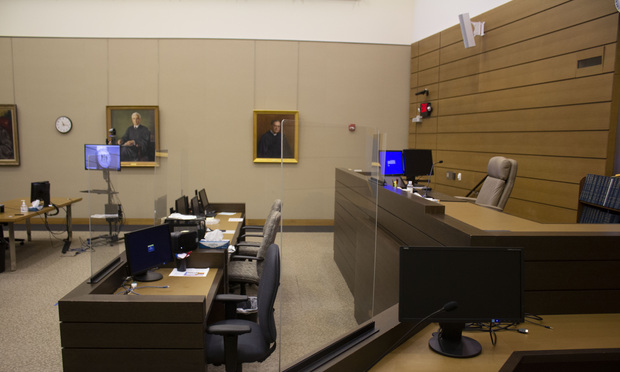How Delaware Courts Have Kept Running During COVID-19
The court's community relations chief said the largest backlogs of cases developed over the past several months in the courts that regularly see higher volumes of cases, including the Justice of the Peace Court, which kept three courts open to the public 24 hours a day, with restrictions, throughout the judicial state of emergency.
July 15, 2020 at 06:02 PM
5 minute read
The original version of this story was published on Delaware Law Weekly
 Select courtrooms at the Leonard L. Williams Justice Center were fitted with glass in front of seats in July as an added precaution against the spread of COVID-19. July 9. Photo: Ellen Bardash/ALM
Select courtrooms at the Leonard L. Williams Justice Center were fitted with glass in front of seats in July as an added precaution against the spread of COVID-19. July 9. Photo: Ellen Bardash/ALM
More than three months since Delaware's judiciary first declared a state of emergency, state courts have reported there likely won't be much of a case load to catch up on as courthouse activity ramps back up.
Since courtrooms were first closed to the public March 23 in response to the COVID-19 pandemic, the judiciary and attorneys have been using remote methods to keep cases moving, many of which are being carried into the courts' reopening stages.
"It is likely that many proceedings that are now being conducted by phone or video may stay that way going forward as they not only help prevent transmission of the COVID-19 virus but have also proved to be easier and more efficient for all involved, saving both time and money," said Sean O'Sullivan, chief of community relations.
Between March 15 and June 15, O'Sullivan said, the Court of Chancery and Superior Court held a combined 643 hearings in civil cases either by phone or video, and an additional 541 criminal proceedings took place in Superior Court. In that time, the Delaware Supreme Court issued 108 final orders and 10 opinions.
Francis Pileggi of Lewis Brisbois Bisgaard & Smith said he noticed little delay caused in the Court of Chancery while court matters were being handled remotely, in part because the court had been using electronic filing and working remotely with attorneys from around the country regularly long before the pandemic began.
"In my experience, the work has still continued behind the scenes. I understand around the country there's not as much work getting done in some other states as there is in Delaware," Pileggi said Monday. "It was common before the pandemic to handle routine (Court of Chancery) motions and even substantive motions remotely, so that just continued in a more pervasive way."
O'Sullivan said the largest backlogs of cases developed over the past several months in the courts that regularly see higher volumes of cases, including the Justice of the Peace Court, which kept three courts open to the public 24 hours a day, with restrictions, throughout the judicial state of emergency.
Chief Justice Collins J. Seitz Jr. extended that judicial emergency for a fourth time July 6, keeping the court system in the second phase of its reopening plan until at least Aug. 6. Members of the public are now permitted to reenter Delaware's courthouses, though jury trials are not being held and remote hearings are still being encouraged.
Decisions on when and how to reopen courts to the public have been made at the recommendation of a committee formed in late April and consisting of members of the judiciary, court staff, the Administrative Office of the Courts, Delaware Department of Justice personnel, Capitol Police and others.
The Courts Reopening Committee, chaired by Superior Court Judge William C. Carpenter, was advised by Alfred E. Bacon III, an infectious disease doctor. A task force, also headed by Carpenter, is now in the process of determining when and how jury trials can safely begin again. A report is expected to be completed by mid-August, with the first jury trials to be held in September at the earliest.
Throughout July, additions to courtrooms have been made to maximize safety as more people return to Delaware's courthouses. Markers have been places on the floor asking people to stand at least six feet apart, plexiglass partitions have been put up to separate parties in court, and screenings are being done as people enter the courthouses.
"We have been forced as a court and as attorneys to try matters that we never had been able to do or never wanted to do in the past through technology and remote processing. We've found now that we can do them, and we can do them well," Carpenter said at a virtual town hall.
People in custody awaiting court appearances for criminal cases are still not being transported to courthouses for in-person hearings and will not be until Phase 3 of the reopening plan. Though speedy trial requirements have been waived while the state of judicial emergency is in place, Sullivan said criminal cases are being given priority, and the court system has worked with the Delaware Department of Correction to streamline a system of video calls.
"The judiciary is keenly aware of the importance of acting quickly and fairly on criminal matters even in the face of a public health crisis," he said.
O'Sullivan said it was determined early on that courts' infrastructure and technology for conducting matters remotely, such as the amount of audio and visual equipment in courtrooms and increasing the number of hearings that could be held remotely in a given day, were lacking.
"Early on, there were some technology challenges to not only ensure that our video and audio conferencing worked with our partners but that it was also was secure. In those early days, when the availability of some audio and video technology was more limited, there were also some scheduling challenges—in that there were only so many proceedings that could be handled in any given day on the available systems," he said. "That is something that has improved greatly during the past few weeks and something that will be a focus going forward."
NOT FOR REPRINT
© 2025 ALM Global, LLC, All Rights Reserved. Request academic re-use from www.copyright.com. All other uses, submit a request to [email protected]. For more information visit Asset & Logo Licensing.
You Might Like
View All
Fed Judiciary Panel Mulls Authority to Ban In-State Bar Admission Requirements



Law Firms Mentioned
Trending Stories
- 1Uber Files RICO Suit Against Plaintiff-Side Firms Alleging Fraudulent Injury Claims
- 2The Law Firm Disrupted: Scrutinizing the Elephant More Than the Mouse
- 3Inherent Diminished Value Damages Unavailable to 3rd-Party Claimants, Court Says
- 4Pa. Defense Firm Sued by Client Over Ex-Eagles Player's $43.5M Med Mal Win
- 5Losses Mount at Morris Manning, but Departing Ex-Chair Stays Bullish About His Old Firm's Future
Who Got The Work
J. Brugh Lower of Gibbons has entered an appearance for industrial equipment supplier Devco Corporation in a pending trademark infringement lawsuit. The suit, accusing the defendant of selling knock-off Graco products, was filed Dec. 18 in New Jersey District Court by Rivkin Radler on behalf of Graco Inc. and Graco Minnesota. The case, assigned to U.S. District Judge Zahid N. Quraishi, is 3:24-cv-11294, Graco Inc. et al v. Devco Corporation.
Who Got The Work
Rebecca Maller-Stein and Kent A. Yalowitz of Arnold & Porter Kaye Scholer have entered their appearances for Hanaco Venture Capital and its executives, Lior Prosor and David Frankel, in a pending securities lawsuit. The action, filed on Dec. 24 in New York Southern District Court by Zell, Aron & Co. on behalf of Goldeneye Advisors, accuses the defendants of negligently and fraudulently managing the plaintiff's $1 million investment. The case, assigned to U.S. District Judge Vernon S. Broderick, is 1:24-cv-09918, Goldeneye Advisors, LLC v. Hanaco Venture Capital, Ltd. et al.
Who Got The Work
Attorneys from A&O Shearman has stepped in as defense counsel for Toronto-Dominion Bank and other defendants in a pending securities class action. The suit, filed Dec. 11 in New York Southern District Court by Bleichmar Fonti & Auld, accuses the defendants of concealing the bank's 'pervasive' deficiencies in regards to its compliance with the Bank Secrecy Act and the quality of its anti-money laundering controls. The case, assigned to U.S. District Judge Arun Subramanian, is 1:24-cv-09445, Gonzalez v. The Toronto-Dominion Bank et al.
Who Got The Work
Crown Castle International, a Pennsylvania company providing shared communications infrastructure, has turned to Luke D. Wolf of Gordon Rees Scully Mansukhani to fend off a pending breach-of-contract lawsuit. The court action, filed Nov. 25 in Michigan Eastern District Court by Hooper Hathaway PC on behalf of The Town Residences LLC, accuses Crown Castle of failing to transfer approximately $30,000 in utility payments from T-Mobile in breach of a roof-top lease and assignment agreement. The case, assigned to U.S. District Judge Susan K. Declercq, is 2:24-cv-13131, The Town Residences LLC v. T-Mobile US, Inc. et al.
Who Got The Work
Wilfred P. Coronato and Daniel M. Schwartz of McCarter & English have stepped in as defense counsel to Electrolux Home Products Inc. in a pending product liability lawsuit. The court action, filed Nov. 26 in New York Eastern District Court by Poulos Lopiccolo PC and Nagel Rice LLP on behalf of David Stern, alleges that the defendant's refrigerators’ drawers and shelving repeatedly break and fall apart within months after purchase. The case, assigned to U.S. District Judge Joan M. Azrack, is 2:24-cv-08204, Stern v. Electrolux Home Products, Inc.
Featured Firms
Law Offices of Gary Martin Hays & Associates, P.C.
(470) 294-1674
Law Offices of Mark E. Salomone
(857) 444-6468
Smith & Hassler
(713) 739-1250






